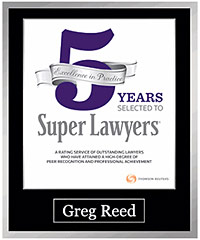Obtaining disability benefits for Migraine Headaches
Can I get disability benefits if I am suffering from the effects of Migraines?
Author: Attorney Greg Reed
Updated: 1/16/2024
Migraine headaches affect more than 10% of people worldwide, occurring most often in people 20-50 years of age. According to the American Migraine Foundation, migraine headaches are the second leading cause of global disability. In the United States one in four households has a person suffering with migraine headaches. If you are suffering from the effects of migraine headaches you may qualify for disability benefits.

If you are suffering from the effects of Migraine headaches and have been denied disability don’t give up, almost 70% are denied initially! Just call 512-454-4000 for a free, no obligation consultation to learn what your options are.
Though each person experiences migraines differently, the most common symptoms include:
- Pain in temples or behind one eye or ear
- Sensitivity to light, noise or strong smells
- Dizziness
- Seeing spots or flashing lights
- Ringing in the ears
- Nausea and vomiting
- Blurry vision or not being able to see at all
- Neck stiffness
- Pins and needles sensations
- Numbness in the face
- Weakness
- Difficulty speaking
- Food cravings
Any of these symptoms can certainly affect your ability to maintain employment.
Migraine headaches vary in frequency, occurring less than 15 days per month (episodic) or more than 15 days per month for three or more consecutive months (chronic).
More than 4 million people experience chronic migraines daily. Job attendance is a big part of maintaining employment.
Unfortunately, there is no cure for migraines currently; treatment focuses on relieving pain and managing symptoms.
Doctors can prescribe medications that may be taken during an attack as well as preventive medications to reduce the frequency and severity of headaches. Patients can also avoid things that trigger migraines, reduce stress and get enough sleep. If you apply for disability, you will need to demonstrate that you are following your doctors prescribed treatment plan, doing the best you can to combat the debilitating issue.
Can I get approved for Social Security Disability if I can’t work because of migraines?
Migraine headaches interfere with a person’s work and social life and their ability to care for themselves.
Many individuals have to stay in bed or a dark room for hours or days, and medication may not be effective or have side effects. Approximately 90% of individuals who experience migraines are unable to work during an active migraine headache and often hours or days after an attack. According to the American Headache Society, 113 million workdays are lost due to migraine attacks in the U.S. each year, and absence from the workplace can have a severe impact on an individual’s career and finances.
Social Security has created a manual called the Blue Book which lists impairments Social Security considers disabling and may automatically qualify for benefits.
Because migraine headaches are not recognized as an impairment in Social Security’s Blue Book, there are no specific guidelines to be eligible for Social Security Disability Income. In order to qualify for disability benefits, you must prove that your migraine headaches equal the criteria of a listing in the Blue Book or are so severe that you cannot perform basic work tasks on a regular basis. For example, to qualify under a brain injury, you would have to meet the requirements of that listing, Section 11.18. You may also be able to qualify under Epilepsy Section 11.02, if you can show that chronic migraines limit your ability to function as much as that listing for dyscognitive seizures.
To be approved, you must show that despite following a doctor’s prescribed treatment:
- You have migraines at least once a week for at least three consecutive months; OR
- your migraines occur at least once every two weeks for three consecutive months and cause you to be limited in at least one of the following:
- concentrating and completing tasks
- physical functions, such as standing and walking
- understanding and using information
- interacting with others
- adapting to change, managing your emotions and taking care of yourself
Social Security will want to see objective medical evidence supporting your application, including:
- A doctor’s diagnosis of recurrent migraines;
- Results of tests performed to rule out other conditions;
- Imaging tests, such as a CT scan, MRI, and EEG;
- Doctors’ notes regarding the frequency and severity of migraines;
- Records from ER visits and hospitalizations due to migraines;
- Medications and other treatments tried, including results and side effects.
Make sure you obtain regular medical treatment.
An applicant who contends that their migraines are disabling but has not tried several different medications or followed a doctor’s recommendations will not be credible to Social Security. It is helpful to keep a personal record of daily tasks you need help with when you are having a migraine attack, like washing or cooking and shopping. Be sure to keep track of the frequency and length of attacks as well as days you miss work because of migraine attacks because these factors play a very important part in whether or not you are approved. You must prove that your medical condition has reduced your work productivity by at least 15 % of the acceptable level. If you consistently need to stop work because of a migraine headache, or miss work several days per month, you will not be able to maintain full-time employment.
If your symptoms do not match those of a Blue Book listing, you may still qualify if you can prove that migraine headaches interfere with your ability to work so much that you cannot perform your old job or any job.
Again, you must be severely limited in concentrating, comprehending instructions, getting along with others, lifting objects, walking, and standing or sitting for long periods of time. Social Security is mainly interested in your functional limitations and how they impact your daily life. You may be experiencing difficulty speaking or having problems concentrating. Social Security will conduct a Residual Functional Capacity (RFC) assessment to evaluate your physical and mental capabilities to determine if there is any job you can do, taking into consideration your age, education and whether or not you can drive. Even better, ask your doctor to fill out an RFC form and a mental RFC form; Social Security places a lot of weight on doctors’ opinions. Social Security is interested in whether you can do any full-time job, not just your previous job. If Social Security decides you cannot do your old job or don’t have the skills to perform a new job, you may be approved for a Medical-Vocational Allowance. If Social Security decides you are capable of another type of employment, your application will be denied.
We were hired by a Travis County resident who was suffering from a number of impairments including intracranial hypertension, migraines, and impaired cognition which prevented him from working.
The Social Security Administration originally determined the claimant to have no severe physical impairments and that the claimant could perform a range of light work, consequently he was denied disability benefits. At the hearing attorney Daniel Messenger presented additional medical evidence and testimony that his client suffered from intercranial hypertension, causing migraine headaches and cannot sustain employment due to dizziness, lightheadedness, memory problems, and deficits in concentration associated with his medical condition.
On appeal the judge found the SSA’s original opinion was incorrect and awarded our client full disability benefits.
A client suffering from migraines headaches from the Central Texas area applied for disability benefits and was initially denied.
She hired us to represent her at her disability hearing. Initially the SSA found that the claimant did not have an impairment that meets or medically equals the severity of one of the listed impairments. The claimant was determined to have the residual functional capacity to engage in sedentary work, with the ability to occasionally lift or carry 10 pounds. Additionally, they can stand and walk for a total of 2 hours during an 8-hour work day, while being able to sit for a total of 6 hours during the same period. The client was said to have psychological limitations such that they can understand, remember, and carry out routine instructions and interact occasionally with the public.
Attorney Daniel Messenger presented significant medical documentation to demonstrate the extent of his client’s limitations. He proved that the claimant was more limited than the SSA previously assessed, and unable to sustain competitive work on a regular and continuing basis. Mr. Messenger proved that the claimant’s migraine symptoms negatively impaired her functioning and that the claimant was not able to hold any employment that requires reading of printed or digital text, presence in a nosy or bright environment, operation of a vehicle or other machinery, or manual labor. According to the testimony of the vocational expert, the claimant would experience excessive off-task behavior and frequent absences, making it difficult for them to sustain employment in a competitive job.
The judge found that claimant’s acquired job skills do not transfer to other occupations within the residual functional capacity defined, and considering the claimant’s age, education, work experience, and residual functional capacity, there were no jobs that exist in significant numbers in the national economy that the claimant could perform. The judge ruled that a finding of “disabled” was appropriate and the client was awarded full disability benefits.
A Dale, Texas client suffered from pseudotumor cerebri, which causes intractable headaches.
The headaches, in conjunction with pulsatile tinnitus, awoke the client at night and prevented sleep, which caused her to develop symptoms of depression. Her doctor wrote that she was unable to perform the material duties of her occupation or a qualified alternative. A board certified neurologist stated that she was totally disabled due to her multiple conditions which included chronic, daily headaches.
SSA awarded SSDI, but Cigna denied her LTD claim. Bemis, Roach & Reed filed a claim and subsequently obtained a settlement.
If you are 55 or older or have another medical condition you may get approval.
Social Security follows a set of rules to determine when the agency expects an applicant to learn a new job.
Applicants who are 55 or older often fall under a grid rule, which means they are not expected to learn a new job. For example, a 55-year-old applicant with little education and a history of unskilled work might be found disabled. If you can’t go back to your old job, and you don’t have the skills to learn a new one, Social Security will likely grant you disability benefits.
You may also be eligible for Social Security Disability benefits if you have another medical condition.
Some illnesses that often occur in people with migraines include depression, anxiety, irritable bowel syndrome and sleep disorders. The Headache & Migraine Policy Forum states that nearly 90 percent of people with chronic migraine have another chronic health condition. One disorder alone may not meet the criteria of an impairment as stated in Social Security’s Blue Book, but if you have more than one medical condition, Social Security must consider how those health issues combined limit your ability to hold a job and perform necessary daily tasks.
Social Security also has basic financial requirements.
Before you are eligible for Social Security disability benefits, you must satisfy some basic financial requirements.
You must: 1) have a disability that has lasted or is expected to last 12 months; and 2) you must have worked in a job where you paid Social Security taxes long enough and recently enough; and 3) you must not earn more than Substantial Gainful Activity (SGA), which is $1,550 per month in 2024 for nonblind applicants and $2,590 per month for blind applicants.
What if I don’t qualify for SSDI?
If you haven’t worked long enough to earn enough work credits, or if you earn too much income, you may be eligible for disability benefits through another Social Security program, such as Supplemental Security Income (SSI), or from a long-term disability insurance plan through your employer or a privately purchased policy.
SSI is a program that pays monthly benefits to people with limited income and resources who are disabled, blind, or age 65 or older. SSI is based on income instead of work credits, and is financed by general funds of the U.S. Treasury.
I have long-term disability insurance – should I file a claim?
Yes – you should file a claim as soon as you become disabled.
Long-term disability insurance (LTD) is coverage that protects your income if you are unable to work due to illness or injury and is purchased as part of a group employment plan or privately through an insurance company. Policies pay between 50-60% of your salary and benefits continue until you return to work or for the number of years stated in the policy. However, note that LTD coverage is good only as long as you are employed, so do not quit your job before you file a claim, and be sure to check your policy’s definition of “disabled” as each policy will state the definition of “disabled” which is in use. Additionally, be aware that long-term disability insurance companies can require a claimant to also apply for SSDI.
If you are suffering from Migraines and have been denied disability don’t give up, almost 70% are denied initially! Just call 512-454-4000 for a free, no obligation consultation to learn what your options are. Have some questions? just give us a call, we love to help folks just like you!
How do I file for Social Security Disability benefits?
You can apply for Social Security Disability benefits online, over the phone, or in person at your local Social Security Administration office.
Don’t be discouraged if your initial application is denied because most are, and you will have the opportunity to appeal. There are four steps to the Social Security appeal process:
- File a Request for Reconsideration with the Social Security Administration to completely review the case.
- If you don’t agree with SSA’s response to your Request for Reconsideration, you can request a hearing before an Administrative Law Judge (ALJ). ALJs are attorneys who work for the Social Security Administration; they review SSDI and SSI cases and either uphold or overturn decisions to deny SSDI or SSI benefits. If you are not represented by an attorney at this point, now is the time to obtain legal counsel. This is a critical point in the process and will raise your chance for success.
- If an ALJ does not grant your claim, you can request that the Appeals Council review your case.
- Federal Court review. The final step in the appeal process is filing suit in U.S. District Court.
Do I need a disability attorney for SSDI or SSI?
If you cannot work because of migraine headaches, you may be eligible for Social Security Disability benefits, but qualifying is difficult and applying for SSDI or SSI can be a complicated process.
Migraines may make it difficult to fill out forms and if you have problems reading, concentrating, or writing, you should consider getting help. Your chances for approval are increased significantly if you have legal representation. At each potential stage of the process, from the initial application stage, the reconsideration stage and the ALJ hearing stage, an attorney can assist you in completing the detailed forms and questionnaires required by Social Security, collecting and submitting relevant medical evidence, and preparing questionnaires for your doctors. At the ALJ hearing phase an attorney will not only continue to assure that the evidence is complete, but prepare you for questioning by the ALJ, prepare an argument on your behalf and question any doctors or vocational experts selected by the ALJ to testify at the hearing. At the Appeals Council and federal court level, a lawyer can present legal arguments to show your case was wrongfully denied. Fees charged by disability attorneys are regulated by federal law and are usually 25% of disability backpay you are owed. There are no out-of-pocket costs, and if you don’t win your case, you won’t be charged anything.
Do I need a disability attorney for a long-term disability insurance claim?
Whether you have a long-term disability insurance policy purchased through a private insurance broker or a group policy purchased with your employer, filing a claim for long-term insurance is a complex process.
The wording of LTD policies can be confusing and the laws and regulations which affect the two types of LTD insurance differ in their procedures for filing claims and appeals. An experienced LTD attorney with thorough knowledge of ERISA laws and regulations will avoid mistakes and increase your chance of success. An attorney will act on your behalf, completing your application and filing your claim in a timely manner. They can also negotiate a settlement or file an appeal for you. If it becomes necessary to file suit, an LTD attorney can prepare your case against an insurer. Most LTD attorneys handle cases on a contingency basis and charge approximately 25%-40% of a claimant’s past due benefits. You do not pay an attorney’s fee unless the attorney wins your case.
At The Texas Disability law firm Bemis Roach & Reed, our attorneys are committed to helping injured or disabled clients receive the benefits they deserve. Mr. Roach is AV Preeminent and SuperLawyers rated and has become a recognized leader in the field of Long Term Disability law. Mr Bemis focuses his practice on Social Security disability while Mr Reed handles both LTD and SSDI claims. Both are AV Preeminent and SuperLawyers rated and all our attorneys have been successfully helping people fight for their rights against big insurance companies and the government since 1993. If you have applied for benefits and been denied call 512-454-4000 for a free consultation and get help NOW.
Author: Attorney Greg Reed has been practicing law for 29 years. He is Superlawyers rated by Thomson Reuters and is Top AV Preeminent® and Client Champion Gold rated by Martindale Hubbell. Through his extensive litigation Mr. Reed obtained board certification from the Texas Board of Legal Specialization. Greg is admitted to practice in the United States District Court – all Texas Districts and the United States Court of Appeals-Fifth Circuit. Mr. Reed is a member of the Travis County Bar Association, Texas Trial Lawyers Association, past Director of the Capital Area Trial Lawyers Association, and an Associate member of the American Board of Trial Advocates. Mr. Reed and all the members of Bemis, Roach & Reed have been active participants in the Travis County Lawyer referral service.
Your Free Initial Consultation
At Bemis, Roach and Reed, if we can't help you, we will try to find the right attorneys for you.
We offer each of our prospective clients a free no obligation one hour phone or office consultation to see if we can help you and if you are comfortable with us. We know how difficult a time like this can be and how hard the decisions are. If we can be of assistance to you and help you find a solution to your issue we will even if that means referring you to another attorney.
Or simply call
512-454-4000
to schedule your
Free Consultation
Let's get you Started:
If you could provide us with some basic information about your claim we will get right back with you with a free case evaluation and schedule your Free Consultation Today.










